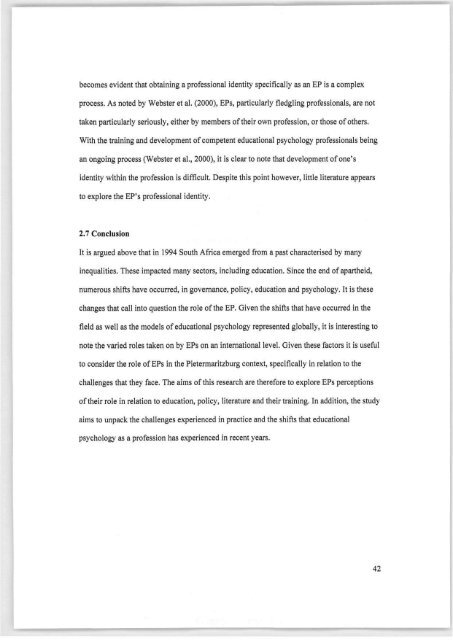Educational psychologists' perceptions of their role in the ...
Educational psychologists' perceptions of their role in the ...
Educational psychologists' perceptions of their role in the ...
You also want an ePaper? Increase the reach of your titles
YUMPU automatically turns print PDFs into web optimized ePapers that Google loves.
ecomes evident that obta<strong>in</strong><strong>in</strong>g a pr<strong>of</strong>essional identity specifically as an EP is a complex<br />
process. As noted by Webster et al. (2000), EPs, particularly fledgl<strong>in</strong>g pr<strong>of</strong>essionals, are not<br />
taken particularly seriously, ei<strong>the</strong>r by members <strong>of</strong> <strong><strong>the</strong>ir</strong> own pr<strong>of</strong>ession, or those <strong>of</strong> o<strong>the</strong>rs.<br />
With <strong>the</strong> tra<strong>in</strong><strong>in</strong>g and development <strong>of</strong> competent educational psychology pr<strong>of</strong>essionals be<strong>in</strong>g<br />
an ongo<strong>in</strong>g process (Webster et al., 2000), it is clear to note that development <strong>of</strong> one's<br />
identity with<strong>in</strong> <strong>the</strong> pr<strong>of</strong>ession is difficult. Despite this po<strong>in</strong>t however, little literature appears<br />
to explore <strong>the</strong> EP's pr<strong>of</strong>essional identity.<br />
2.7 Conclusion<br />
It is argued above that <strong>in</strong> 1994 South Africa emerged from a past characterised by many<br />
<strong>in</strong>equalities. These impacted many sectors, <strong>in</strong>clud<strong>in</strong>g education. S<strong>in</strong>ce <strong>the</strong> end <strong>of</strong> apar<strong>the</strong>id,<br />
numerous shifts have occurred, <strong>in</strong> governance, policy, education and psychology. It is <strong>the</strong>se<br />
changes that call <strong>in</strong>to question <strong>the</strong> <strong>role</strong> <strong>of</strong> <strong>the</strong> EP. Given <strong>the</strong> shifts that have occurred <strong>in</strong> <strong>the</strong><br />
field as well as <strong>the</strong> models <strong>of</strong> educational psychology represented globally, it is <strong>in</strong>terest<strong>in</strong>g to<br />
note <strong>the</strong> varied <strong>role</strong>s taken on by EPs on an <strong>in</strong>ternational level. Given <strong>the</strong>se factors it is useful<br />
to consider <strong>the</strong> <strong>role</strong> <strong>of</strong> EPs <strong>in</strong> <strong>the</strong> Pietermaritzburg context, specifically <strong>in</strong> relation to <strong>the</strong><br />
challenges that <strong>the</strong>y face. The aims <strong>of</strong> this research are <strong>the</strong>refore to explore EPs <strong>perceptions</strong><br />
<strong>of</strong> <strong><strong>the</strong>ir</strong> <strong>role</strong> <strong>in</strong> relation to education, policy, literature and <strong><strong>the</strong>ir</strong> tra<strong>in</strong><strong>in</strong>g. In addition, <strong>the</strong> study<br />
aims to unpack <strong>the</strong> challenges experienced <strong>in</strong> practice and <strong>the</strong> shifts that educational<br />
psychology as a pr<strong>of</strong>ession has experienced <strong>in</strong> recent years.
















